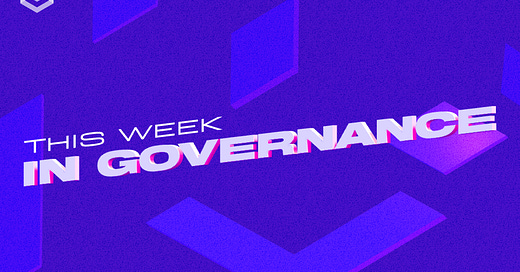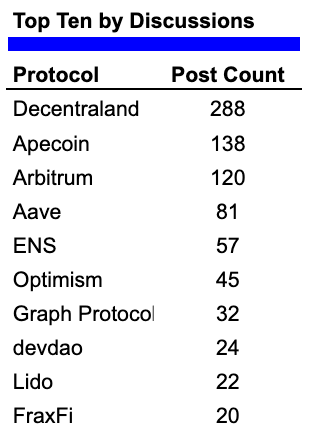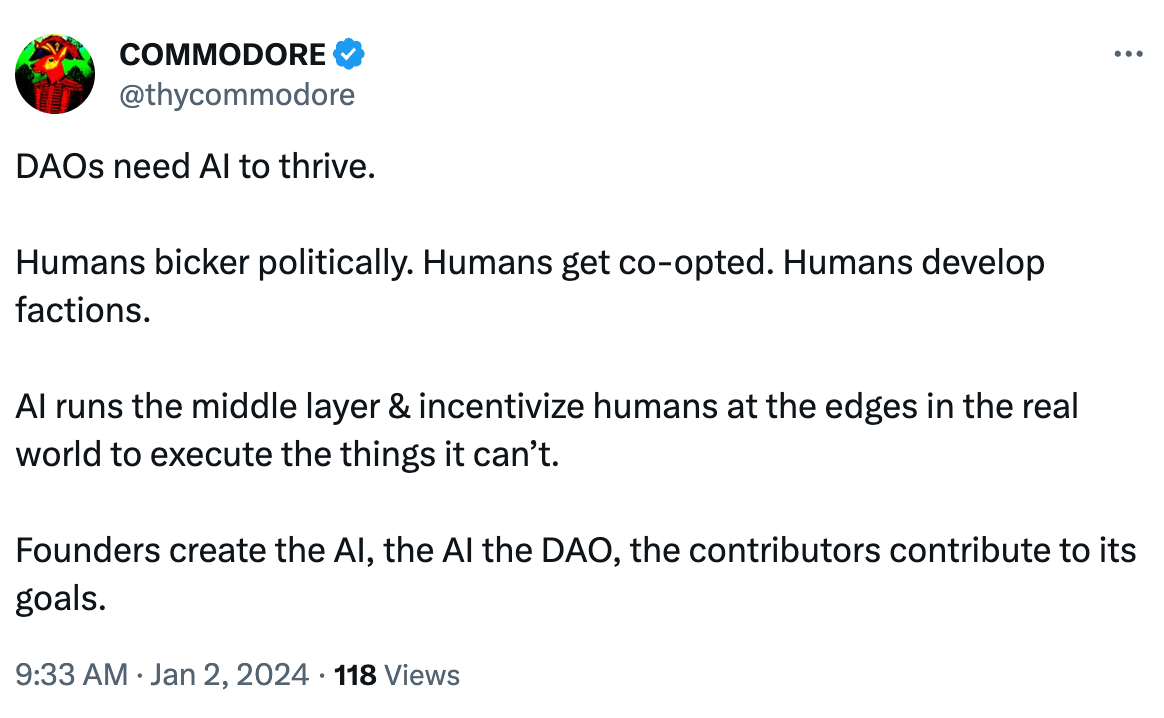🗳 This Week in Governance - January 4: Purportedly Decentralized
A weekly resource covering crypto governance, politics, and power.
📣 Key Points
SEC settles with “purportedly decentralized” BarnBridge DAO
Aave Governance v3 is live
SuperRare votes to compensate Council members
Arbitrum seeks to upgrade chains
Bankless proposes brand clarity
Voting Activity (L7)
🗳️ 28,495 ballots
👥 21,970 voters
📜 184 proposals
🌐 49 active DAOs
Query more data using the Governance API
🚀 Introducing: Boardroom Daily Briefs
Your Daily Update
Receive daily insights as we summarize forum discussions and proposals for your preferred DAOs. Stay up-to-date with the latest developments across your projects with a concise summary of news across your projects. Start browsing briefs today!
📰 News
SEC settles with “purportedly decentralized” BarnBridge DAO
As reported by Coindesk and others, on December 22nd, BarnBridge DAO and its founders agreed to pay $1.7 million to settle allegations by the Securities and Exchange Commission (SEC) for offering unregistered crypto securities to U.S. investors. The SEC's action against BarnBridge, which it describes as being established as “a purportedly decentralized organization (‘DAO’),“ marks a significant move since DAOs typically don't register as companies and often don't view their products as securities needing SEC registration. This highlights the regulatory challenges faced by crypto startups and DAOs in navigating U.S. securities laws.
Aave Governance v3 is live
As of the execution of “Aave Governance V3 Activation Short,” Governance v3 is now live, marking a significant advancement in onchain governance systems for the Aave community. In this new version, voting power can be derived from three forms of AAVE: the token itself, stkAAVE, and AAVE deposited on Aave v3 Ethereum. While the delegation dynamics remain the same as in Governance v2, all delegations have been reset to zero with the activation of the new system. Voting and delegating can be done directly via governance smart contracts or through a user interface developed by BGD Labs, with resources available on GitHub and IPFS. Creating proposals is open to anyone directly on the smart contracts, and the system is designed to be cost-effective, with the Aave DAO covering voting costs in a pilot program.
📜 Proposals
Recently Closed
SuperRare: Proposal to Compensate DAO Council Members
This proposal by the SuperRare Labs team suggests options for compensating members of the RareDAO Governance Council to enhance engagement and quality of contribution. The proposal offers three compensation options: no compensation, $1,000 per month, or $2,500 per month, all paid in $RARE. The council, responsible for treasury management, protocol upgrades, and strategic direction, plays a crucial role in the DAO's operation. The compensation, if implemented, will start following the council election in January 2024 and aims to attract high-quality community members, ensuring active participation. This change would draw from the DAO Treasury but is seen as sustainable due to the DAO's significant $RARE balance. Voting concluded on December 25th with nearly 98% voting for $1k USD equivalent per month.
Ending Soon
Arbitrum: ArbOS Version 11
This AIP for ArbOS Version 11 introduces several improvements to Arbitrum chains, including support for the EVM Shanghai upgrade, the PUSH0 opcode, and various bug fixes. This upgrade, similar to a hard fork, is audited and ready for adoption by Arbitrum chains governed by the Arbitrum DAO, like Arbitrum One and Arbitrum Nova. Key changes include EVM Shanghai support, retryable fee fixes, corrections to the chain owner list returned by precompile, and solutions for precompile methods consuming all gas when reverting. The upgrade also includes new precompile methods for viewing L1 pricing parameters, a fix for static calls emitting logs, and default L1 pricing parameter adjustments. The implementation of ArbOS 11 is detailed in the Arbitrum Nitro git commit, with audits conducted by Trail of Bits. Voting is open and ends on January 7th.
Upcoming
Aribtrum: Proposal to Establish the Arbitrum Research & Development Collective
This proposal for the Arbitrum Research & Development Collective (ARDC) aims to turn Arbitrum DAO members' ideas into reality through research and development. The ARDC will review and enhance governance proposals, conduct security code reviews, and provide economic risk analysis, with a focus on governance optimization, risk management, and security. The proposal includes a structured election process for ARDC members, a legal agreement outlining their duties and responsibilities, and a multi-signature wallet for fund management. The collective will be funded with 1.715 million ARB for a six-month term, and its operations will be transparent, with regular updates and reports. The ARDC's mandate is to support the ArbitrumDAO's strategic priorities through specialized services in research, risk assessment, and security enhancements. Voting begins on January 6th.
🎙️ Rather Listen?
The Boardroom Roundup brings you the latest DAO news headlines and governance proposals every week:
Subscribe to the Boardroom Podcast → Apple | Spotify | Google
📚 Reads
The State of DAOs 2023 [updates], from Web3Citizen
DAO Challenges: Insights from the Governance Geeks Gathering at Devconnect Istanbul 2023, from Radworks and Shelby
Make Ethereum Cypherpunk Again, by Vitalik Buterin
Sybil Resistant Airdrops, by Arun Sajeev
Reflections on RetroPGF Round 3, by Spencer Graham
Updated Ethereum roadmap diagram, from Vitalik Buterin
2023 MakerDAO recap, by PaperImperium
The Endgame for Decentralization in the OP Ecosystem is Stage 2, from OP Labs
🎧 Listens
On the Decentralized Web, Truth, and Human rights: “Hacking Authenticity,” on Web3 with a16z
2023 Wrap Up & 2024 Predictions w/Hudson Jameson, Sirsu, Maya Bakhai, and Stefen Deleveaux, on Rehash
💬 Forums
Bankless: Brand Clarity Between DAO and HQ
The post from Ryan Sean Adams (and co-authors) discusses a proposal to clarify the brand distinction between BanklessDAO and BanklessHQ. The proposal outlines steps to redefine the purposes of both entities, create a permissioned system for brand usage, establish a legal entity to hold intellectual property for the DAO, and implement simple rules for Bankless projects to promote brand clarity. The need for this proposal arose due to confusion and problems caused by the unclear relationship between BanklessDAO and BanklessHQ, as illustrated by negative backlash from a proposal submitted by BanklessDAO on the Arbitrum forum. The proposed steps aim to provide a clearer distinction between the two entities and ensure a more sustainable and coherent brand identity.
Gitcoin: Long tail public goods funding
This forum post discusses the concept of "long tail public goods funding" in the crypto ecosystem, emphasizing how distributions of funding often follow a power law distribution. It highlights the role of crypto-native democratic crowdfunding mechanisms, like quadratic funding, in providing money and visibility to promising projects on the long tail, which can then ascend to wider recognition and impact. The post uses Gitcoin's evolution from a long-tail project to a short-tail public good as an example and advocates for funding the long tail as a discovery mechanism for future big projects, with tools like Gitcoin Grants Stack facilitating this process. Additionally, the post points out that both short tail and long tail public goods are complementary, each playing a crucial role in the ecosystem's overall development.
Gnosis: Introducing more accountability to the GnosisDAO
GnosisDAO, since its inception in 2020, has experienced rapid growth, leading to complexities in tracking and understanding the progress of submitted Governance Improvement Proposals (GIPs). To address this, the DAO plans to restructure the Gnosis Forum for better navigation and introduce a new design. Additionally, teams responsible for GIPs are required to provide regular updates on their progress using a specific template. Future improvements include a GIP dashboard for easy overview, updated GIP templates with milestone settings for larger projects, and exploring fund streaming for certain projects. The community is invited to give feedback on these steps and suggest additional measures to enhance transparency and tracking of GIPs from ideation to completion.
Maker: Spark Spell Proposed Changes
Phoenix Labs proposes several changes to SparkLend on the Ethereum network, outlined in individual polls. These changes include activating the SparkLend Freezer Mom for faster emergency responses, replacing the DAI oracle with a fixed $1 rate, updating the wstETH oracle to a 1:1 peg with ETH, freezing the GNO market and setting its LTV to 0, activating a Lido Rewards Program with wstETH, and increasing the Spark D3M Max Debt Ceiling to 1.2 billion. The proposals aim to enhance operational efficiency, manage risk, and adapt to evolving market conditions within the Maker ecosystem.
💭 Ecosystem Take
🎈 Have a Meme
📮 Stay Up to Date
Follow us: Twitter | Discord
Subscribe to: Newsletter | Mirror | Apple | Amazon | Spotify








